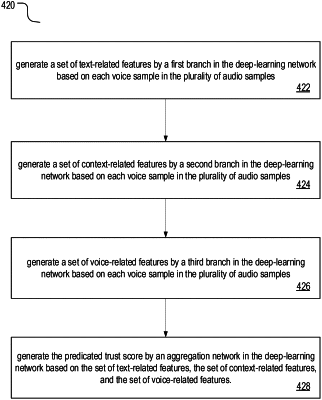| CPC G10L 15/16 (2013.01) [G10L 15/063 (2013.01); G10L 15/22 (2013.01); G10L 25/24 (2013.01)] | 20 Claims |

|
8. A method comprising:
obtaining, by a computing device, a trust score for each voice sample in a plurality of audio samples, the computing device comprising a memory storing instructions executable to construct a deep-learning network to quantify trust scores and a processor circuitry in communication with the memory;
generating, by the computing device, a predicated trust score by the deep learning network based on each voice sample in the plurality of audio samples, wherein the predicted trust score is generated by an aggregation network in the deep-learning network based on a set of text-related features, a set of context related features, and a set of voice related features generated by a plurality of branches of the deep-learning network,
wherein the deep-learning network comprises the plurality of branches and the aggregation network configured to aggregate results from the plurality of branches; and
training, by the computing device, the deep-learning network based on the predicated trust score and the trust score for each voice sample to obtain a training result.
|